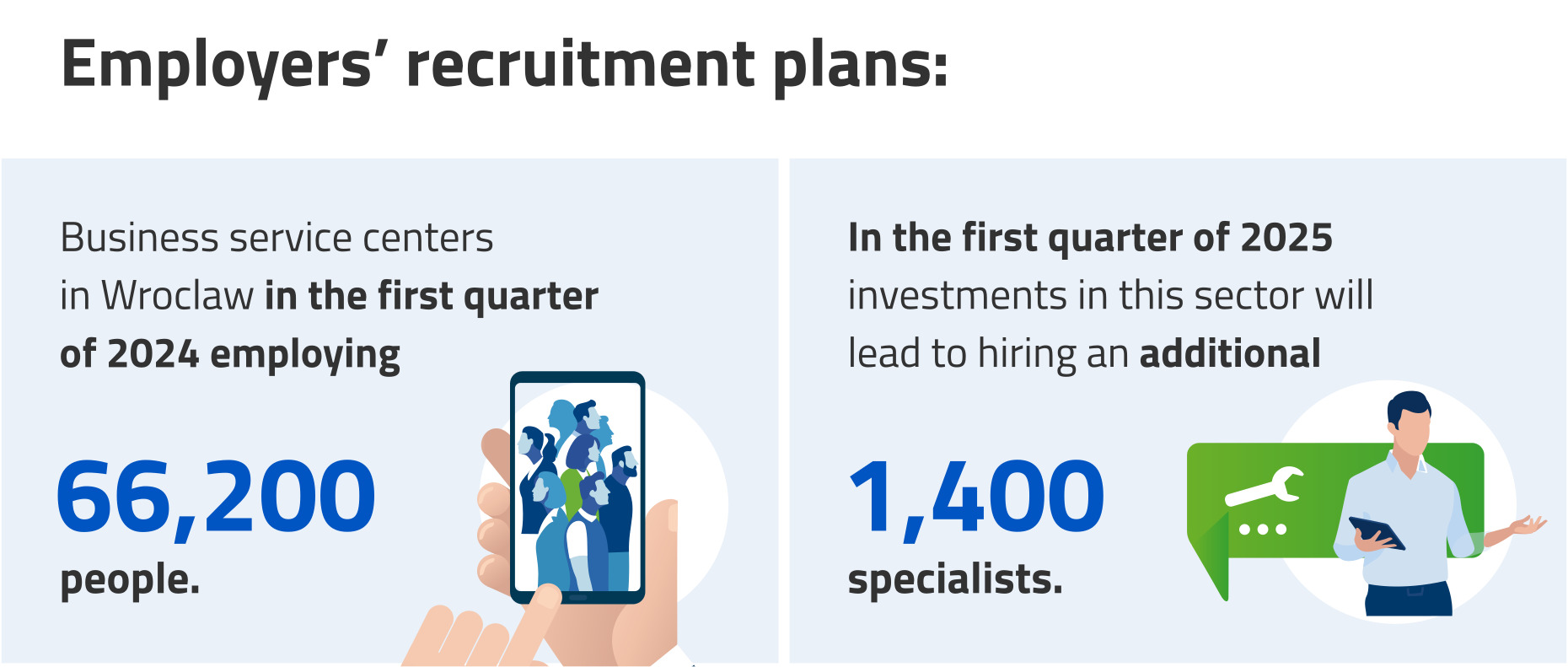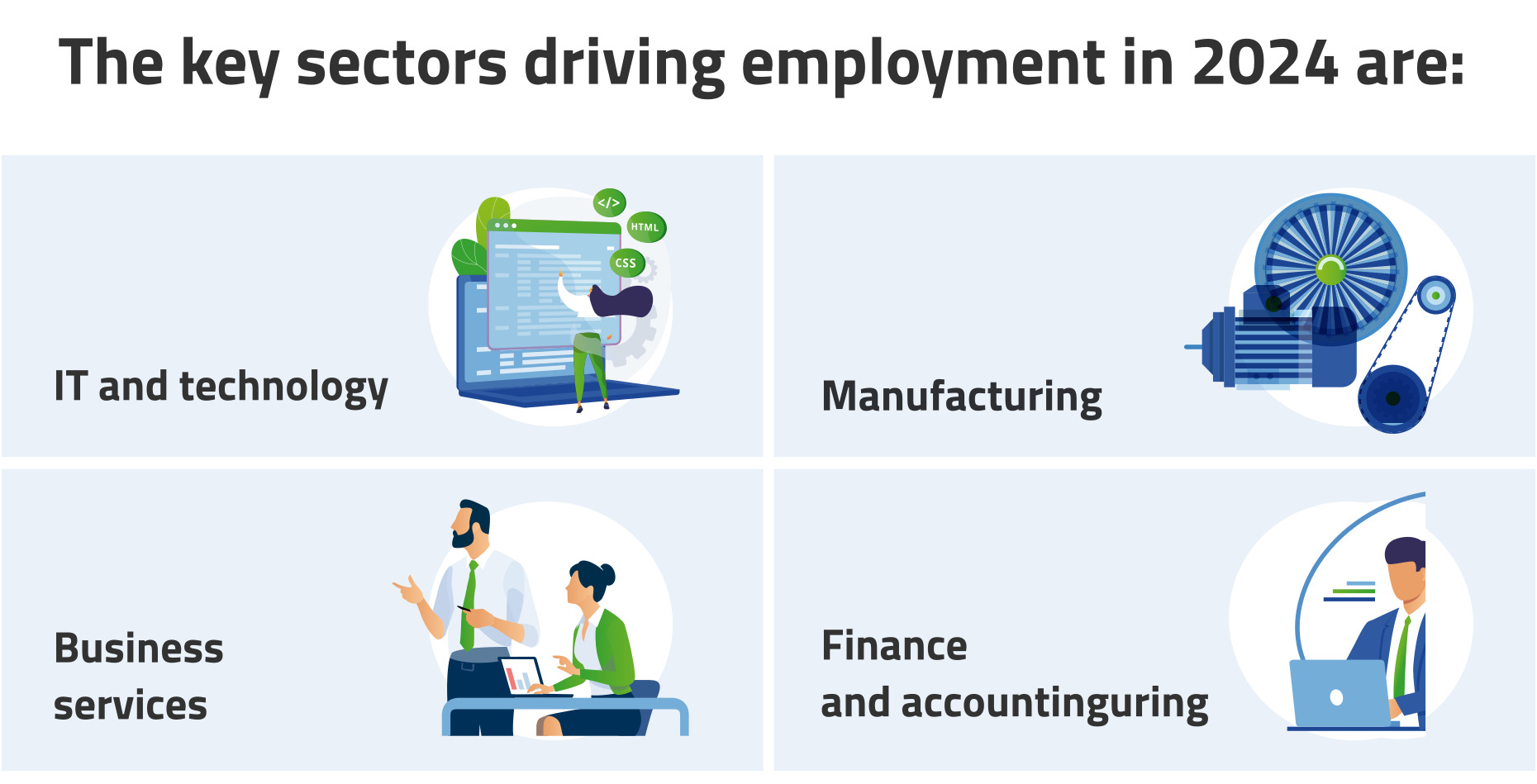Wroclaw's labour market

Wroclaw's labour market - participants, key variables, and growth areas. 151,200 national economy entities, employment at 193,00 people, only 4.5% registered unemployment rate in May 2024. Wrocław, the capital of Lower Silesia, has been one of Poland's leading economic centers for years, consistently attracting both investors and job seekers.
European leader position with growth potential
The authors of the "Polish Startups 2023" survey conducted last year emphasize that Lower Silesia has earned the nickname "Polish Silicon Valley," alongside Mazovia. Out of the 4,841 startup founders surveyed, 50% identified Warsaw and 46% pinpointed Wroclaw as their primary hubs. Wroclaw’s status as a startup hotspot is attributed to its robust academic and scientific community, excellent infrastructure, and strategic geographic location. This favorable positioning facilitates its involvement in major projects for the German industry, which is keen to leverage Polish technological resources.
Wroclaw's potential shines through its impressive ranking in this year's "European Cities and Regions of the Future 2024" by the Financial Times' fDi Intelligence magazine. Celebrated as a city of the future, it claimed the top spot in the category for European medium-sized cities with populations between 200,000 and 750,000, surpassing both Zurich and Vilnius.
The competition committee recognized Wrocław for its ability to attract major investors, such as – Intel, which is constructing a factory here. Its financial commitment will reach $4.6 billion. Additionally, the committee noted the strong and growing IT sector in Wroclaw, driven not only by investments from large corporations but also by numerous emerging startups.
Wroclaw also holds the titles of most business-friendly city and, reflecting the image of its labor market, city of human capital and lifestyle.
Downward and upward trends in the labor market in Wroclaw
Despite many positive developmental aspects, the labor market in Wroclaw faces several challenges. One noticeable downward trend is the increasing competition for top talent. As more companies establish their headquarters and investments in the city, the talent pool continues to shrink. This makes it difficult for employers to attract and retain qualified workers. Competition is particularly intense in the IT and engineering sectors, where demand far exceeds supply.
On the other hand, several upward trends paint a promising vision for the labor market in Wroclaw. Continued investments in infrastructure and education are expected to strengthen it. Wrocław's commitment to promoting innovation and entrepreneurship will create new job opportunities and drive economic growth.

According to data from the Association of Business Service Leaders ABSL, there were 234 business service centers in Wroclaw in the first quarter of 2024, employing 66,200 people. Experts predict that further investments in this sector will lead to hiring an additional 1,400 specialists in the first quarter of 2025.
Since the beginning of 2024, the Polish Economic Institute has periodically published the results of the Monthly Indicator of Economic Sentiment (pol. Miesięczny Indeks Koniunktury MIK), depicting business sentiment. In the June edition, 25% of respondents anticipated that the situation in their companies would improve in the next three months. This marks a significant increase from January, when only 16% of entrepreneurs expected positive changes.
The growth prospects are further underscored by EY’s"Investment Attractiveness of Europe" report. The latest FDI (Foreign Direct Investment) statement shows that 229 of them came to Poland in 2023, distinguishing our country within Europe. Experts point out that these investments are followed by concrete numbers of full-time jobs for specialists - a total of 22,378. This represents a year-on-year increase of 21%.
As a leading hub for attracting investments, Wroclaw stands to benefit significantly from these developments.

Human capital embraces change - forecasts for employees and employers
The unemployment rate in Wroclaw is exceptionally low. According to the Central Statistical Office, there were only 6,600 registered workers out of a population of 673,700 in May. This low unemployment rate means that specialists in various industries enjoy comfortable conditions offered in Wroclaw and seek new,more attractive professional opportunities. This is further supported by investments and the continued growth of the IT, finance, manufacturing, and especially business service centers (BPO/SSC) sectors.
This is confirmed by the results of PageGroup's latest report - Talent Trends 2024: companies can no longer count on the loyalty of their employees. As many as 94% of employees are "open to new opportunities," 55% are actively looking for a job, and 38% are open to new offers but hesitant to make a move. Surprisingly, as many as 64% of employees feel secure in their current positions.
Job seekers' mood
Despite some challenges, the city's strong economic fundamentals, low unemployment rate, and positive employment prospects in key sectors are fostering a good sentiment among job seekers in Wroclaw. The job market is characterized by:
Optimism: A significant number of professionals express confidence in the labor market, and many are considering a job change in 2024.
Skills development: There is a growing emphasis on upgrading skills or acquiring new ones, with many job seekers focusing on developing their digital and interpersonal skills as evidenced by micro-credentials.
Work-life balance: Candidates are increasingly focusing on work-life balance and flexible work arrangements.
Deficit occupations
Workers are taking advantage of the current labor market boom. As Polish society is aging, there is an increasing shortage of specialists with specific competencies. The Occupations Barometer 2024 barometrzawodow.pl - which is a forecast of demand for workers - indicates that employers in Wroclaw are already facing significant shortages in many specialties, including:
- nurses and midwives,
- doctors and paramedics,
- website administrators,
- analysts, testers, and operators of ICT systems,
- database designers and administrators,
- programmers,
- teachers of practical vocational training and general subjects
- electricians, electromechanics, and electrical fitters
- mechanical engineers,
- logistics managers,
- bus, truck, and tractor drivers,
- waiters and bartenders,
- manual workers in production,
- cooks and chefs,
- warehousemen,
- construction fitters,
- finishing workers in construction,
- uniformed services workers,
- beauticians,
- tailors,
- letter carriers and couriers.
PageGroup's Talent Trends 2024 report indicates that employees prioritize work-life balance (51%), competitive pay (46%), and recognition and appreciation (32%).
Factors that may lead employees to switch to another employer include higher pay for a similar position (53%), flexibility in work organization (53%), and company culture and values (31%). CSO data for May 2024 shows that the average gross salary in the enterprise sector was PLN 8883.74.
